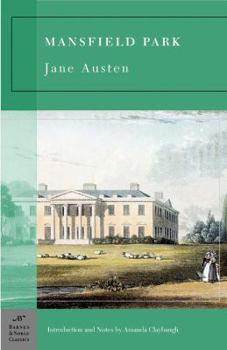Mansfield Park
Select Format
Select Condition 
Book Overview
&&LDIV&&R&&LDIV&&R&&LI&&RMansfield Park&&L/I&&R, by &&LB&&RJane Austen&&L/B&&R, is part of the &&LI&&RBarnes & Noble Classics&&L/I&&R&&LI&&R &&L/I&&Rseries, which offers quality editions at affordable prices to the student and the general reader, including new scholarship, thoughtful design, and pages of carefully crafted extras. Here are some of the remarkable features of &&LI&&RBarnes & Noble Classics&&L/I&&R: &&LDIV&&RNew introductions commissioned...
Format:Paperback
Language:English
ISBN:1593081545
ISBN13:9781593081546
Release Date:August 2005
Publisher:Barnes & Noble Classics
Length:427 Pages
Weight:0.90 lbs.
Dimensions:1.3" x 5.2" x 8.0"
Customer Reviews
5 ratings
A Great Classic
Published by Mera , 2 years ago
I have always loved Jane Austen, and adore all of her books. This is not my favorite out of her novels, but I enjoy it very much. It is full of feeling, and its very easy to see the point of view of the main character as you read along with her journey through this book.
A Less Romantic, More Realistic Austen
Published by Thriftbooks.com User , 18 years ago
As a fairly big Jane Austen fan I came into this masterful novel (after the first fifty pages) expecting a great love story put off by the lowly financial means of the protagonist. However, the central figure, Fanny, has many qualities that make her an ulikely figure for the role of seductress. She is quiet, shy, and completely unsure of herself. She indeed has very few qualities that make the reader expectant that she will be able to marry above her means. Instead of an enthralling love story I found the novel full of subtle but interesting social commentary and excellent characterization of the protagonist. While not quite a Pride and Prejudice style page turner, Mansfield Park is worthwhile for its character development and carefully crafted, mature writing.
Not Austen's best, but still wonderful
Published by Thriftbooks.com User , 19 years ago
After having read (and loved) Jane Austen's more famous novels EMMA and PRIDE AND PREJUDICE, I found MANSFIELD PARK a true delight. Fanny Price is taken in by her wealthy aunt and uncle as charity to her more lowly-married mother, and is raised with her cousins with the idea she needs refinement and education to become as good a woman as her lesser social standing will allow. Fanny is nervous and self-effacing, struggling with her new situation until her cousin Edmund makes her feel more at home. Gradually, she feels like a part of the family, although the nagging sense of unworthiness always asserts itself. As cousins marry and suitors appear, as scandals arise and emotions become known, Fanny finds herself in the equivalent of a Victorian soap opera. Fanny is undoubtedly one of Austen's less assertive characters, although she does mature into a woman who knows what she wants and will accept no less. I loved Fanny and her honesty, the little girl who fears the stars in her eyes and still manages to grow up into a respectable - and respected - woman. Her complexities are subtle and understated, making the reader work at times to understand her motivation, although anyone who has felt like an outcast even once, or anyone who respects honesty, will identify with her. In true Austen fashion, the observations are witty, with pointed social analysis and cynicism dressed up in sly humor. Fanny's aunts in particular are skewered, but no one, not even Fanny, is spared. Readers picking up this novel for the sheer delight of it will find it difficult to put down, as its language is accessible and free-flowing. Students and book club members who must pay closer attention to themes and other literary issues may want to consider the role social standing and money play; the evolution of Fanny's character (and whether she is sympathetic); the techniques Austen uses to evoke humor; and the courtship protocol for Victorian England and how the characters both work within, and violate, the social rules. I highly recommend this book for teenagers and adults alike, especially those whose literary tastes run toward the classics.
Mansfield Park, revisited
Published by Thriftbooks.com User , 23 years ago
It's been more than a year since I originally reviewed this book, and since then it's been fun to read the war of words between Fanny-defenders and Fanny-bashers; one reviewer says she can't understand this "hate" of Fanny, while another is amazed at the "loathing" Fanny engenders in some readers, and a third admonishes that appreciating Fanny's saintliness takes time and harrumphs, "Fanny upholds what is right, how not to love her?" I have read and reread "Mansfield Park" (it's one of my all-time favorites) and my response regarding Fanny is, "what's to love?"The reviewer who described Fanny as an "odious little priss" hit the nail slam-bang on the head; Fanny is an impossible killjoy. She is a case of conscience run amok, without any of the tempering graces of understanding or acceptance. Whatever emotions Fanny engenders, hatred or loathing doesn't come into it; there is not enough in Fanny's character to loathe. What she engenders in this reader is more like a profound sense of irritation; one wants to grab her by the shoulders, give her a good shake and tell her to lighten up. Jane Austen's other heroines know how to leaven virtue with common sense and a dash of humor, none more so than Elizabeth Bennet in "Pride and Prejudice"; Fanny acts like she never cracked a joke in her life and wouldn't understand a joke if she heard one, let alone appreciate it. She is thus a perfect match for her cousin Edmund, who is the most puzzling character in this excellent book.I have never yet come across a sympathetic character in a novel who becomes so thoroughly unsympathetic as Edmund Bertram. He certainly starts out as likeable enough, as Fanny's champion and protector from her obnoxious aunt Norris. We can understand and sympathize when he falls in love with Mary Crawford, whose worldly upbringing makes her despise his vocation as a minister. But Mary is torn between her materialistic ambitions and her genuine affection for Edmund. She really loves him and appreciates his good qualities, as he is able to love her for hers; he realizes she is shallow and superficial, but she is also loving, kind, generous, open-hearted, and doesn't have a mean bone in her body. She is "the only woman he could ever want or accept for a wife."So what happens to blow this whole scenario to bits? In Edmund's eyes, Mary is insufficiently outraged by the adulterous relationship between her brother and Edmund's married sister. Edmund is in anguish when Mary says she is disgusted by their stupidity in carrying on the affair. For him, this proves she is totally without virtue. But is she really? Mary may have been as outraged as Edmund was; but where Edmund can only think of retribution, Mary is more concerned with damage control. Where Edmund insists on divine and temporal punishment and damnation, Mary prefers to try to make the best of a bad situation. For Edmund, Mary's common sense translates into vice. From a paragon of virtue, she suddenly becomes a mons
A different side to Austen nonetheless entertaining
Published by Thriftbooks.com User , 25 years ago
After reading all of her other works beforehand, 'Mansfield Park' struck me, like many readers, as almost told by a different person from the Austen we know. It is darker, much more humourless (the scenes of comedy are much less evenly spread, and even then they are tainted despairingly sarcastic rather than her usual warm irony), and with a very different heroine. It would appear a quieter, if more intelligent version of Harriet Smith from 'Emma' has taken centre stage here--that is, meek little Fanny Price.Don't despair. It's brilliant as always.To begin with, this time Austen's novel contains much more 'action'--what I mean by that is her prose actually describes her characters doing things, even with a touch of ! dramatic climax! to them, something she'd never done before. (Apart from a few scenes of Lydia's wedding in "Pride and Prejudice", Austen's novels usually just contain large blocks of dialogue between characters with the occasioanl longer expositional block detailing the passage of time.) The arrival of Sir Thomas, for example, at the end of volume one, is, surprisingly, thrillingly done with no small amount of adrenaline shocked into the reader, knowing what exploits he will catch his children in the middle of.The humour is a sad loss, but then in this novel Austen deals with more 'racy' topics than her usual, which she probably felt deserved even more severe treatment than she would normally dispense to her characters through her razor-sharp tools of irony. The moral quotent, therefore, is much higher than normal--then again Austen never featured a married woman's affair before, did she?The last thing other readers complain about is the lack of any attractive characters in the novel, save Fanny's older brother, William Price (I'd agree there--he was delicious!). Many people dislike and even detest little fanny, after the 'spirited' and 'lively' exploits of Elizabeth Bennet and her kin.Notice how often the word 'lively' is linked to the poisonous Miss Crawford in this novel, and I think you'll see she was trying to make no small point about how dangerous an over-'spirited' girl could get!I don't understand this hate of Fanny. Is it just because she's a disappointment from Eliza? Because she's morally invincible? Because she turns down the dashing hero (Henry Crawford) to marry boring but steadfast old Edmund? I can't find sufficient evidence to hate her in ANY of the above. She's a pleasant, intelligent, charmingly emotional little girl--certainly a pleasant change from that spoiled brat Emma Woodhouse.My concluding statement is this: MP is a very enjoyable novel, if somewhat different from Austen's other works. Even if you come away wishing Fanny Price would drop dead on her pious little head, you should still read it. It's moral lessons are important, it's characters are vital additions to Austen's repetoire, and it reveals a very important shift in Austen's attitude in later
Mansfield Park Mentions in Our Blog

15 Marvelous Book-to-Screen Adaptations from Masterpiece
Published by Ashly Moore Sheldon • May 25, 2021
And in the category of our favorite things: Book-to-screen adaptations! For over fifty years now, Masterpiece (Formerly Masterpiece Theatre) has been bringing fantastic novels to the small screen in the form of series, miniseries, and movies.






